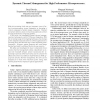71 search results - page 2 / 15 » Lossless and Dissipative Distributed Systems |
ISLPED
1999
ACM
13 years 9 months ago
1999
ACM
A recent trend in low power design has been the employment of reduced precision processing methods for decreasing arithmetic activity and average power dissipation. Such designs c...
COMPLEXITY
2010
13 years 2 months ago
2010
When an isotropic object is accelerated by plane waves, its limiting speed is less or equal to the wave speed. We study the acceleration of anisotropic objects in classical wave-p...
CC
2002
Springer
13 years 5 months ago
2002
Springer
Global variable promotion, i.e. allocating unaliased globals to registers, can significantly reduce the number of memory operations. This results in reduced cache activity and less...
ISPA
2005
Springer
13 years 10 months ago
2005
Springer
The way conventional Ethernet is used today differs in two aspects from how dedicated system area networks are used. Firstly, dedicated system area networks are lossless and only d...
HPCA
2001
IEEE
14 years 5 months ago
2001
IEEE
With the increasing clock rate and transistor count of today's microprocessors, power dissipation is becoming a critical component of system design complexity. Thermal and po...

